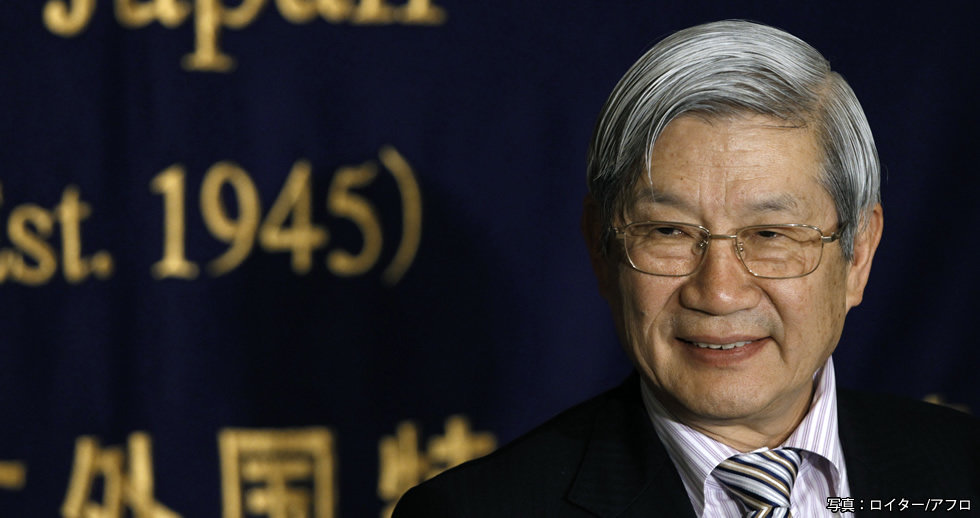Makoto Iokibe, Professor Emeritus of Kobe University and former president of the National Defense Academy, passed away on March 6th, 2024. Prof. Iokibe achieved tremendous studies on the history of Japanese Politics and diplomacy. Also, he had been taking the lead in post-earthquake reconstruction since the Great Hanshin earthquake. One of his students, Dr. Robert D Eldridge (Senior Fellow at JIIA) kindly wrote a mourning letter for Prof. Iokibe. We posted his letter with a wish everyone would remember Prof. Iokibe eternally as below.
I first met my future academic advisor 30 years ago in February 1994. I had requested a meeting with him to discuss my desire to enter the master's program at Kobe University under his care that spring. I waited outside his office door for quite a while. He was late to the appointment. People who knew him would understand and are probably laughing because he was often running late.
At a private funeral for him in March this year, the priest at Iokibe sensei's church (Francis Xavier Iokibe Makoto was Catholic) even alluded to his lateness. Or more exactly, his ability to talk on and on with no regard for the time.
I called Iokibe sensei's lateness--usually about 15 minutes--either the "Iokibe hōshiki (formula)" or the "Kobe Formula," in part a reference to the city's reluctance to allow warships to visit its ports unless they declare themselves to be nuclear-free and a point of contention in the U.S.-Japan alliance since its adoption in 1975.
Iokibe sensei was late that day in early 1994 because he had just arrived on to the Rokkōdai Campus from Shin-Kobe Station, where he had disembarked after a trip to Tokyo to meet with Prime Minister Hosokawa Morihiro. After getting settled and making introductions, he said to me, "Well, Robert-san, if you were to meet with the Prime Minister now, what would you tell him?"
I don't remember what I answered, but the good professor was happy enough, it seems, with it to say, "If you are really serious about sitting for the entrance exam, read this book, that book, this one, and that one," handing me a bunch of texts in Japanese. I realized I had a lot of reading to do in only a short time.
I had been in Japan a little more than three and a half years by this point and had only recently passed the 1st Level of the Japanese Language Proficiency Test, which at the time was a requirement to enter the graduate school there. In college I had not really studied about Japan before, so Japanese political history was a new field to me other than what I had observed during my time in Japan and read on my own about.
Somehow, I passed the written and oral exam, and entered Kobe University's Graduate School of Law in April as a first-year master's student (M1). That "somehow" was, in retrospect, Iokibe sensei's kindness and ability to mentor people to bring out their best. He did so for me, as well as a lot of other people, both his direct advisees as well as anyone who showed up at his office door or in his classroom. He would also guide and help the staff of the many organizations for which he served in leadership capacities.
It was one of those officials (from Kumamoto Prefecture) who contacted me as soon as he heard the sad news of Iokibe sensei's passing, moments after I heard the same bad news from one of my former classmates. That several years had gone by since that junior official worked for Iokibe sensei as a secretary and yet he still felt responsible to inform people about the unfortunate news demonstrates the love and loyalty Iokibe sensei had earned over the years.
Iokibe sensei loved people--his family and friends, students, and colleagues. He also loved many of the historical figures he covered in his writings. Or perhaps better said--he found something to like and respect in almost everyone. He recognized that everyone was human, with both good and not-so-good qualities. He chose to look for the good in people.
In the latter decades of his life, he became particularly close to Japan's political leaders, advising Obuchi Keizō and many others on foreign affairs and domestic matters. He also went on many missions on behalf of the Japanese government to explain his country's views and history to the world and find out what the leaders and public of other countries were thinking.
Iokibe sensei's message was clear: Japan was a force for good in the world and a model for others. It was not perfect, but it learned and sought to improve. Similarly, the United States was a valuable ally and true friend for Japan and was a critical partner in Japan's modern and postwar development. Moreover, Iokibe sensei also explained how important Japan was to the United States. Both countries, in other words, needed one another.
Despite his busy schedule of meeting with officials, traveling the world, running conferences and academic associations, Iokibe sensei had time for his students both academically and personally. In my case as a self-financed student for most of my graduate school years, he took a special interest in making sure I was getting by financially. Early in my first year in the Master's Program at Kobe University, he gave me several jobs helping with his projects.
One was to type up the transcripts of interviews he had done with figures involved with the Allied Occupation of Japan, one of his main areas of research. The transcript I most remember working on was that of Charles L. Kades, deputy chief of the Government Section, and the discussions about the making of the postwar constitution. I still refer to that interview in classes I teach about what eventually became Article 9 and Japan's postwar security policies.
Other work that would come later included being his teaching assistant for his undergraduate classes (that he was often late to the classroom, so I would just start on time) and translating articles, chapters, and later books from Japanese to English. I was proud to get his work introduced into the English-speaking world as he had important things to say.
Another one of the jokes about Iokibe sensei, that he shared in, was his handwriting. I thought it artistic and beautiful, but most people found it atrocious and hard to read. Somehow, I was able to read most of it, a skill I was particularly proud of. If I could not read it and a classmate was nearby such as Hattori Ryūji, Andrew Beaton, Takahara Shūsuke, Murai Ryōta, Kusunoki Ayako, or Murakami Tomoaki, we would try to decipher it like we were reading Egyptian hieroglyphics. If there was no one around, I would show it to my then-girlfriend (and future wife) or her parents, who were slightly older than Iokibe sensei and were already big fans of his. If they had trouble reading his writing, I would then ask Iokibe sensei directly. He generally could read his own writing, but even he had trouble at times. As such, I did not feel that bad, thinking my Japanese language ability was at fault.
Iokibe sensei gave teaching and his relationship with his students his all. His zemi (seminar) was run with passion, and included many get-aways with the students, especially to wooded retreats in the nearby mountains of Kansai where we could debate, play sports outside, and enjoy each other's company at dinner or afterwards. There were also many trips to various places, including abroad. My limited budget prevented me from leaving Japan, but I did join in on several of the domestic trips to Matsuyama, Kinosaki Onsen, and hiking on Mt. Rokko with Iokibe sensei and his youngest daughter followed by a dip in Arima Onsen.
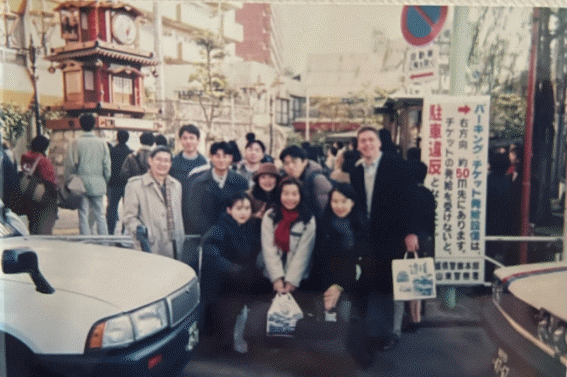
Iokibe sensei (left), the author (right) and his classmates during a trip to Matsuyama in early 1996.
Photo provided by the author
Toward the end of my second year in the Master's Program, I had Iokibe sensei to myself almost one whole day. He came to my room in Toyonaka (I lived in a rundown, former business hotel with shared facilities) at the time, and he went through my entire Master's thesis, checking the Japanese language version. He set himself up on my bed against the wall and asked questions, such as "what did I mean to say here?" He even brought food for us, but we were so engaged in the project that we forgot to eat. I was able to graduate and go on for the Ph.D. program I think thanks to that day.
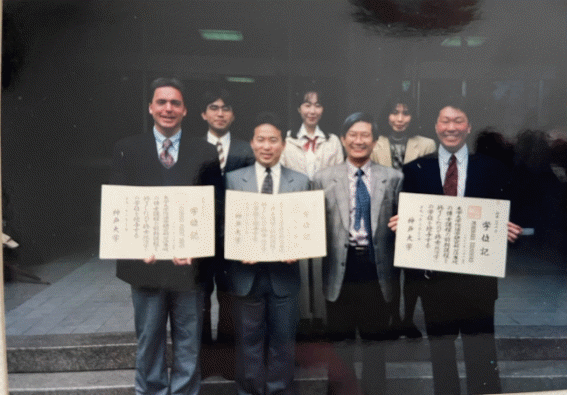
The author (left) with his classmates and Iokibe sensei at their graduation ceremony at Kobe University with their Master's Degree in March 1996.
Photo provided by the author
I had not planned to go on for a doctorate, at least at that point, but had been encouraged by him to do so and decided to apply for the program in early 1996. Shortly before, in September 1995, the U.S.-Japan relationship was rocked by the abduction and rape of a 12-year-old schoolgirl in Okinawa by three U.S. service members. I realized that in my own master's thesis, I had not touched on Okinawa at all, which was par for the course then. I decided to examine postwar U.S.-Japan relations from the perspective of Okinawa for my doctoral dissertation.
In early 1997, near the end of my first year in the Doctoral program, I spent a month in Okinawa affiliated with the University of the Ryukyus under the care of Professor Gabe Masaaki and got bogged down in documents. I called Iokibe sensei one evening to consult with him, and he gave me very sensible advice. He began by asking, "Robert, do you want to be an Okinawan specialist or an expert on U.S.-Japan relations?" When I answered, "an expert on U.S.-Japan relations," he said that focus would guide me as to which materials to look for when I was gathering documents and analyzing them. He wanted, in other words, me to see the larger picture as I was doing a deep dive during fieldwork. The proverbial forest and trees. He probably, too, wanted me to stay focused and to be able to complete my dissertation on time, aware that occasionally some Ph.D. candidates end up never finishing.
That was my second trip to Okinawa, the first one being in the summer of 1996. Since then, I have traveled to Okinawa approximately 150 times, and lived there a total of 8 years most of which when I later worked for the U.S. government after leaving Osaka University.
On my first trip to Okinawa in the summer of 1996, I went by ferry and brought my mountain bike, having just dodged a typhoon which almost cancelled the ferry. I attended a peace studies conference at Okinawa University in Naha at the suggestion of another professor at Kobe University, a fellow cycling enthusiast, Professor Ronni Alexander.
This was a very interesting time to be there, as tensions between the Japanese government, led by Hashimoto Ryūtarō, and Governor Ota Masahide were playing out in the Supreme Court over the issue of the latter's refusal to sign proxy leases for land being used for military purposes. It was also on the eve of the first-ever prefectural referendum on the bases. (Since then, there have been four other base-related referendums in Japan, and I have covered everyone.)
During my second stay, as I was doing the historical research about which I consulted Iokibe sensei, I also started gathering information and conducting interviews on the prefectural referendum. I ended up publishing my first major scholarly article on that topic in Asian Survey the following year (1997). The article took a lot of time to prepare, but the reviews were outstanding, and it is still referenced today in writings about Okinawa. (One referee said it "was the best article ever written about Okinawa.")
Fortunately, I finished my dissertation on time as well, too. My girlfriend, who had become my fiancée in the fall of 1996, and I were married in my hometown a few weeks after I returned from my fieldwork in Okinawa. Iokibe sensei was unable to attend the wedding in March 1997 but had kindly given a letter to be read at the reception afterwards by two classmates, Minohara Toshihiro and Hattori Satoshi, who made the long journey to New Jersey, a thoughtful act I will never forget.
I was very lucky to be surrounded with highly focused classmates during the Master's and Doctoral programs, all of whom went on to successful academic and publishing careers, something that made Iokibe sensei very proud.
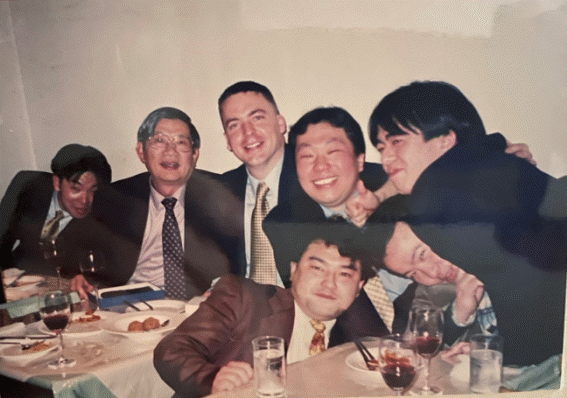
Iokibe sensei, the author, and his classmates at one of the many dinners organized to celebrate one another's accomplishments under Iokibe sensei's mentorship.
Photo provided by the author
Two days after graduating from Kobe University with my Ph.D., my daughter was born on April 2, 1999. I asked Iokibe sensei and his beautiful and gentle wife, Yoshiko, to be my daughter's Godparents, as they were both Catholic. They generously agreed, and joined us and my mother, who flew to Japan in May for the Baptism ceremony at Ikeda Catholic Church next to our town of Kawanishi City. (It was the first time for my mother to meet the Iokibes, and she of course took an immediate liking to them.)
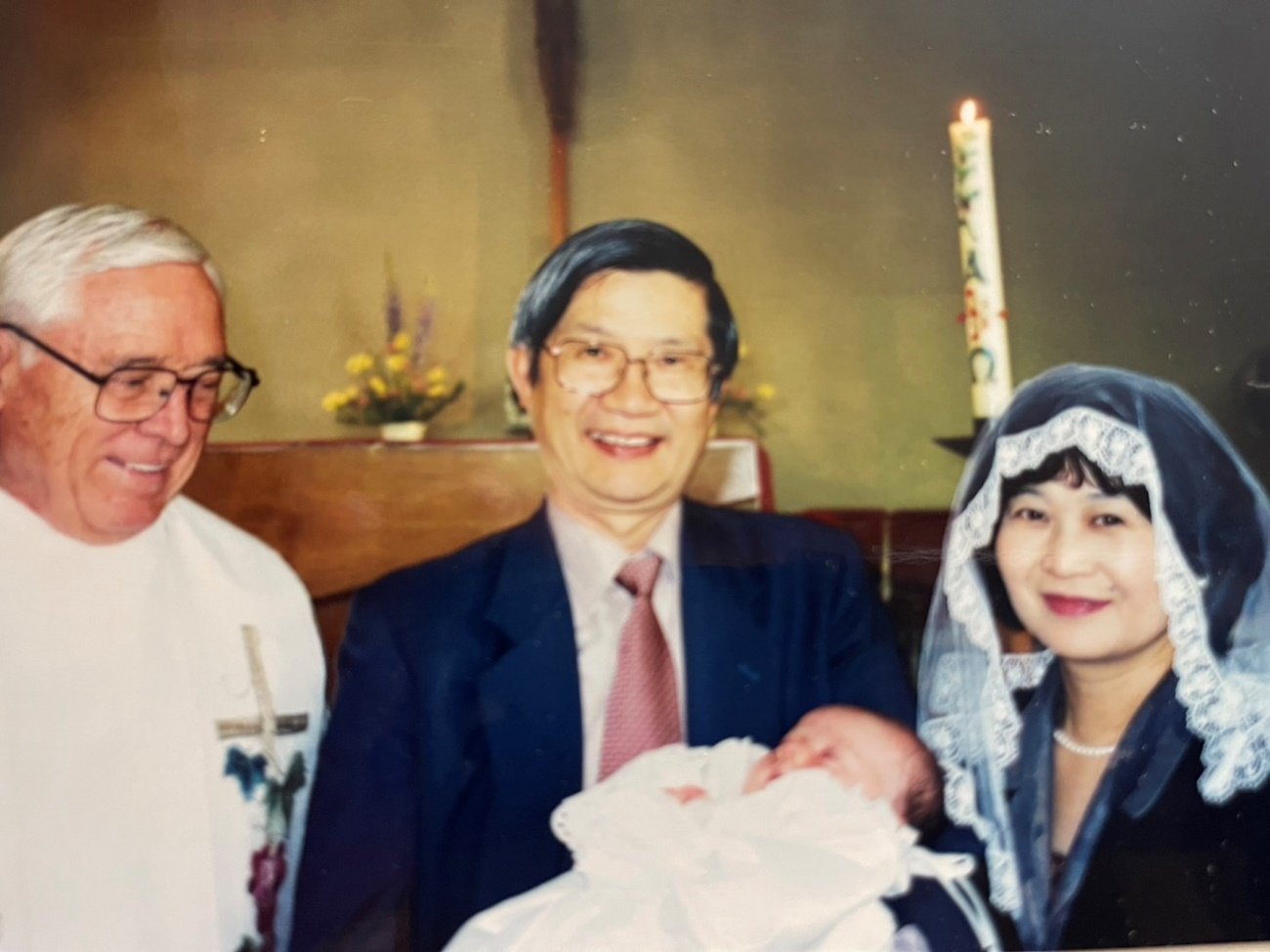
Iokibe sensei (center) and his wife, Yoshiko, and Father Denis with the author's daughter at her Baptism in May 1999 at Ikeda Catholic Church, Ikeda City, Japan. Iokibe sensei and his wife were the Godparents.
Photo provided by the author
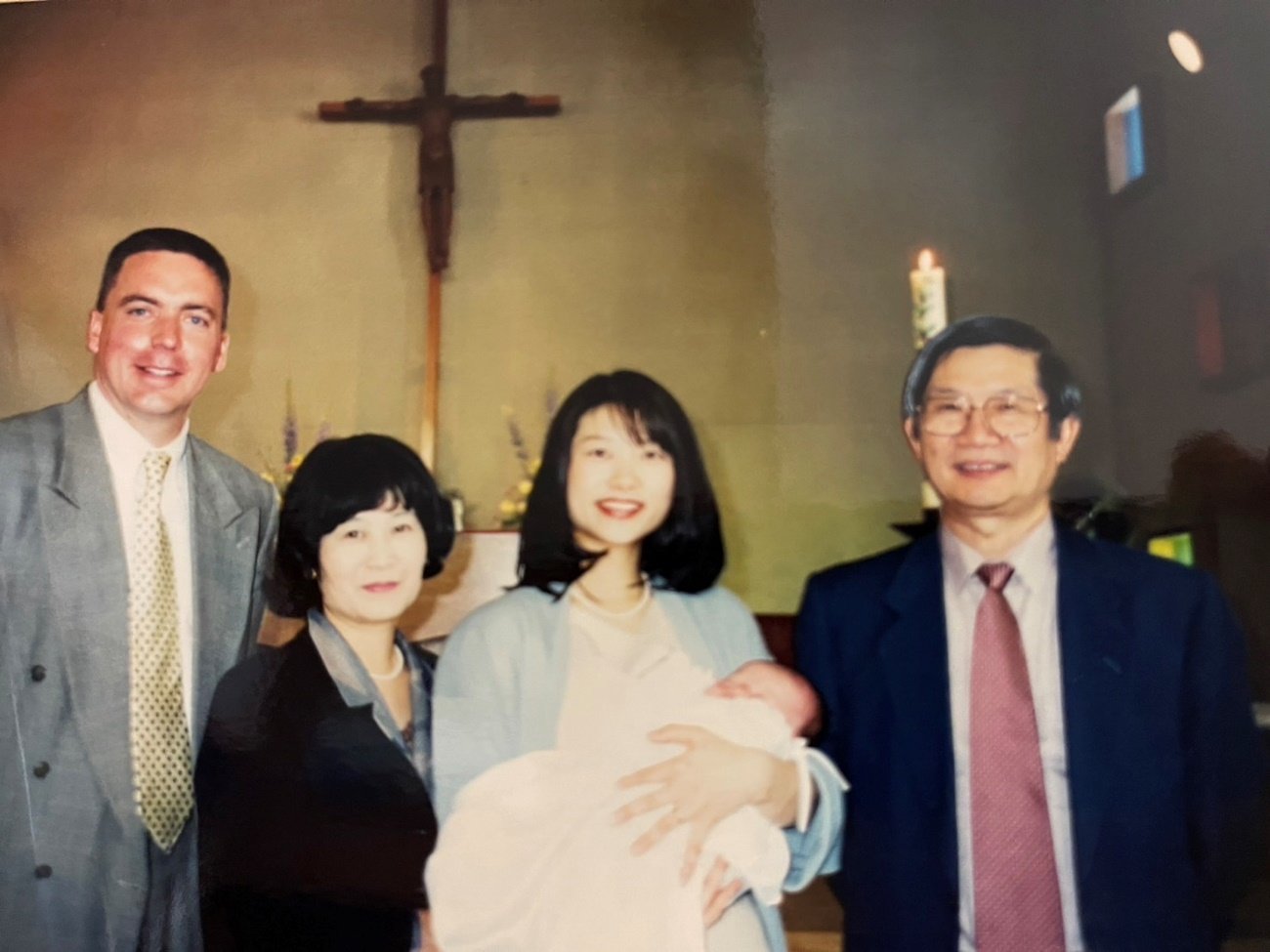
The author and his wife with Iokibe sensei and his wife, Yoshiko, at Ikeda Catholic Church for the Baptism of the author's daughter in May 1999.
Photo provided by the author
Iokibe sensei, still worried about my financial ability to make a living, arranged for me to be offered a postdoctoral fellowship at the Suntory Foundation in Osaka as a Torii Fellow. This was a great experience as I was able to pursue my research with little extra responsibilities as well as attend many of the interesting research meetings and retreats organized by the Foundation.
In addition to getting my dissertation ready for publication (it came out in English in 2001 from Routledge as The Origins of the Bilateral Okinawa Problem: Okinawa in Postwar U.S.-Japan Relations, 1945-1952 and in Japanese later in 2003), I began working on the next period, which I call "The Road to Reversion." I immediately began focusing primarily on two U.S.-Japan bilateral events that preceded the reversion of Okinawa, and which formed precedents for the return. One concerned the reversion of the Amami Islands, and the second was the reversion of Ogasawara and Iwo Jima. Eventually, these two studies became books themselves, one published in 2003 on the occasion of the 50th anniversary of the return of the Amami Islands, and the other in 2008, on the occasion of the reversion of the Ogasawara Islands.
After the Suntory Fellowship ended, I pursued a one-year fellowship with the Research Institute for Peace and Security in Tokyo under the care of Dr. Watanabe Akio through the sponsorship of the U.S.-Japan Foundation in which I worked on policy recommendations for Okinawa. The published study was widely disseminated and regularly referenced. Interestingly, when I began working in Okinawa in 2009 as the Deputy Assistant Chief of Staff, G-7 (Government and External Affairs), Marine Corps Installations Pacific, I was able to utilize those recommendations as I was then in the position to fully implement them.
The recommendations had also caught the attention of the U.S. Marine Corps' leadership at the time, and I was later invited to pursue a one-year sabbatical from 2004-2005 within the command of Marine Corps Forces Pacific at Camp Smith in Hawaii under the Lieutenant General Wallace C. Gregson, who later became Assistant Secretary of Defense for the Asia-Pacific under President Barack Obama in his first term. This began a close relationship with the U.S. Marine Corps, which led me to eventually leave Osaka University and officially join the U.S. government.
Not surprisingly, if you have read this far, it was Iokibe sensei who had introduced me to Osaka University as well. That call came around New Year's (either the final days of December 2000 or the first days of January 2001). I was planning on returning to the United States, where I been offered a position at my alma mater, Lynchburg College (now the University of Lynchburg), in Virginia. I had not yet told Iokibe sensei my decision when he called to tell me Osaka University was interested in me. I mentioned my plans, but he encouraged me to at least speak with Professor Hoshino Toshiya, who was in charge of recruiting at the time. I did, and after debating for a couple of months what to do, I decided to accept the position at Osaka University.
My reasons to accept the position at Osaka University were that as I was a Japan expert, I should be based in Japan in order to be able to do interviews here and get my information in real time, rather than delayed or through second-hand sources. Furthermore, as I was specializing in Okinawan affairs, if I stayed in Osaka, I could easily get to Okinawa and Tokyo to do research whereas if I were back on the East Coast of the United States, that would be much more difficult.
This relates to another piece of advice Iokibe sensei gave me very early in my career. He told me I should try to live and work in Kansai, rather than moving to Tokyo. True, there were far more opportunities in the capital, but he cautioned that it was highly likely I would get so busy in Tokyo, attending meetings, sitting on committees and councils, doing media appearances, etc., that I would not be able to get any serious research done. He explained that by being in Kansai I could beg off from those kind of commitments due to the travel and costs involved. "Stay in Kansai where it is green, the air is clean, and family and friends are close by and where you can do your research quietly," he emphasized, "and choose only those meetings and events you wish to go to in Tokyo or elsewhere." It was the ultimate statement on work-life balance. I have tried to follow it throughout my career, even if it hindered certain opportunities. (I have warned in a book I published in 2020 in Japanese about higher education that the gap in academic resources and opportunities between scholars based in Tokyo and those outside need to be dramatically improved if Japan is going to be internationally competitive.)
Staying in Japan and working at Osaka University proved to be the right choice personally and perhaps professionally as well. We live in the same neighborhood my wife grew up in, and our house is only a 30-second walk from her family home. We can see them everyday, and they get to see their grandchildren whenever they want.
Yes, "grandchildren" as in the plural. Our second child, my son, was born four months after my joining the faculty of Osaka University. I literally raced home on my mountain bike to be there for his birth. Normally a 45-minute ride, I think I got home in 35 minutes.
One of my favorite moments and photos of Iokibe sensei is him playing with my son in Tokyo at an award ceremony in the fall of 2003 for my book on Okinawa that was published earlier that year in Japanese by Nagoya University Press. My son, then-two years old, was in a suit on the floor playing. Iokibe sensei, also in a suit, got on the floor with him to play. He loved children, and he loved playing. Iokibe sensei played as hard as he worked.

Iokibe sensei with the author's son at the 25th Suntory Award in November 2003.
Photo provided by the author
When I did eventually leave Osaka University to work as a senior official for the Marine Corps in Okinawa, Iokibe sensei was probably worried about the toll this highly political and unrewarding job would take on me and my family, as well as the likelihood it would have on my ability to do research.
While the job was indeed difficult physically and mentally, interestingly my research productivity tripled after I left Osaka University, which, as a national university, was heavy in paperwork and other non-teaching, non-research responsibilities. More importantly, I felt working in the policy area and being located in Okinawa for some time was necessary for my understanding of the dynamics surrounding the "Okinawa Problem" to deepen and grow. I don't regret the choice the choice to temporarily leave academia and work in Okinawa for the U.S. military as I learned a great deal. Iokibe sensei observed this growth from afar, although I am sure he continued to worry, like parents often do.
Iokibe sensei had a similar dilemma a few years before that when he left Kobe University in mid-2006 to serve as the 8th President of the National Defense Academy in Yokosuka. He had consulted with me and his other mentees. I thought it a great move for him, and for the country. Fortunately, he was able to preserve much of his freedom as an academic while working in a senior position (the equivalent of a four-star general) appointed by the Prime Minister in the Ministry of Defense.
I would regularly speak and meet with Iokibe sensei during those years to keep him abreast of my work in the U.S. government as well as to help him and his associates, such as the Suntory Foundation and National Defense Academy, with their understanding of the U.S.-Japan alliance and the U.S. Marine Corps' role in it.
The busiest period of communication with him was after the Great East Japan Earthquake and Tsunami in March 2011. I was immediately dispatched as the Political Advisor with the Forward Command Element for the U.S. Marine Corps (later U.S. Forces Japan) to the Ground Self-Defense Force's Camp Sendai, which is where the headquarters of the Tohoku Army Command, one of five regional Army commands throughout Japan, is located. The Tohoku Command was headed at the time by General Kimizuka Eiji, with whom I had long been acquainted and who had served as Iokibe sensei's vice president at the National Defense Academy prior to being appointed to his position (as a three-star general) to Sendai. On March 14, General Kimizuka was named the Commander, Joint Task Force-Tohoku, in charge of the response to the disaster.
Iokibe sensei and I spoke regularly during that time, and he told me to give my full support to General Kimizuka, including to cheer him up when necessary. I was more than happy to oblige. General Kimizuka, as we all know, did an amazing job but died way too young four and a half years later in late 2015, shortly after retiring.
After the disaster, I had the opportunity to present lessons learned at meetings and conferences Iokibe sensei organized through his presidency of the Hyogo Earthquake Memorial 21st Century Research Institute, introducing my original recommendations as well from March 2006 that predated the disaster but were not, unfortunately, utilized by officials in the years prior to the March 2011 disaster.
This was another area that our lives were very much intertwined--disaster response, preparedness, and mitigation. Iokibe sensei and I both experienced the January 1995 Great Hanshin-Awaji Earthquake, but in his case, his home was greatly damaged. He also lost in the earthquake one of his most promising seminar students, Mori Wataru, who was planning a career in journalism and already received a promise of employment from one of Japan's leading newspaper companies. I became involved in volunteer efforts and interpreting for international relief operations, and Iokibe sensei on understanding the lessons learned. He would continue this passion--no, mission--until the end of his life.
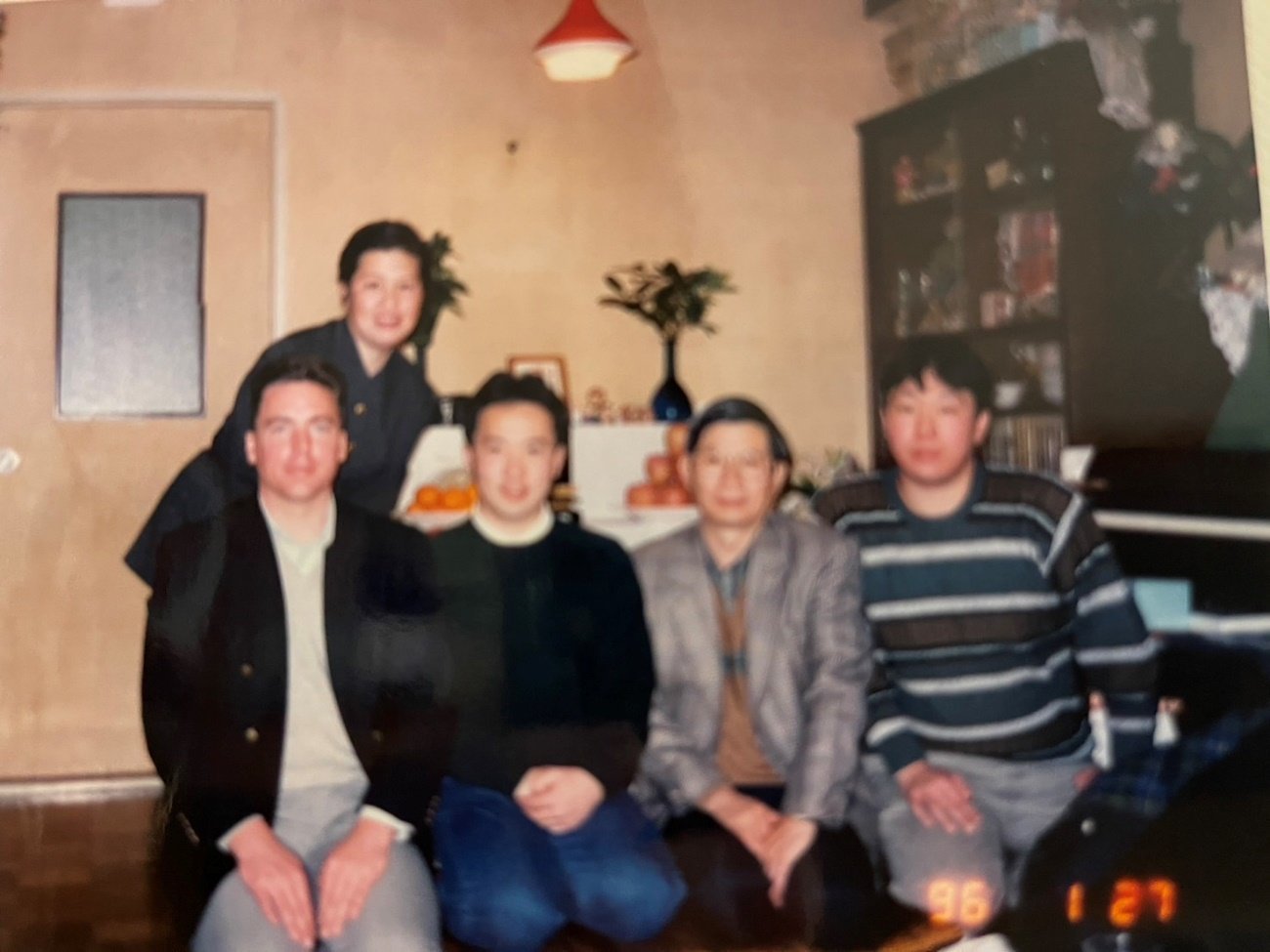
Iokibe sensei paying his respects at the family home of Kudō Jun, a classmate of the author tragically killed in the January 1995 Kobe earthquake, in early 1996 in Ehime Prefecture. Although Jun was under the care of another professor our first year in the Master's Program, he was a big fan of Iokibe sensei. Iokibe sensei in turn cared about all the students, regardless of which professor was mentoring them. Jun's mother, Mrs. Kudō, is standing above the author (left). Also in the photo are classmates Takahara Shūsuke (next to author) and Minohara Toshihiro (right).
Photo provided by the author
In addition to the March 2011 disaster, in which his cadets from the National Defense Academy were active in responding to, he also helped after the April 2016 earthquakes in Kumamoto, where he was then serving as Chancellor, Kumamoto Prefectural University much like he did after the Tohoku disaster with planning for the region's rebuilding and reconstruction.
Like with his students and research, Iokibe sensei gave his all to whatever tasks he was given. As a Christian, he probably felt it was important to use the talents that God had given him. He certainly did use those talents--compassion, intelligence, courage, among a countless number.
There are indeed so many more aspects of Iokibe sensei's professional and personal life that could be introduced here. I could probably write on and on for days about the many experiences I had with Iokibe sensei and things I learned from him and about him.
I was so fortunate to have known him for more than 30 years. He was an extraordinary teacher, scholar, mentor, and friend. Indeed, he was as close to being family as possible without being blood related.
For this reason, I felt honored to have been invited to the private funeral held for him early the following week after his passing. That it was held on March 11, the anniversary of the Great East Japan Earthquake and Tsunami, had an even more special meaning.
Iokibe sensei is in Heaven now, reunited with his wife, parents, and other family members and friends who preceded him. However, I am certain he is continuing his research and discussions with deceased world leaders and other scholars. I am certain, too, that as a caring family man, loyal friend, and dedicated educator, he is continuing to watch over his family, friends, and students on Earth from above.
The last time I saw Iokibe sensei face-to-face was in 2023 at a Self-Defense Forces music concert in Nishinomiya, which I attended with my wife. He looked great, and happy, lending his support and showing his appreciation to the men and women making up Japan's postwar military, some of whom he personally mentored while leading the National Defense Academy.
In the interim since we last met, I did not get the chance to tell him before he passed about my joining the Japan Institute of International Affairs as a Senior Fellow in December last year. I am sure he knew of it through our shared networks, including his son, Kaoru, a University of Tokyo professor, who is also involved with the work of JIIA. I wish, however, I could have told him in person. In light of Iokibe sensei's long history of cooperation with JIIA, I am certain he was very happy to have heard about my appointment. I will do my best to carry on his style of mentorship, especially with all the promising Young Fellows coming from around the Indo-Pacific region, and his commitment to research.
Rest in Peace, Iokibe-sensei, and thank you for everything. The world became a better place thanks to you.

